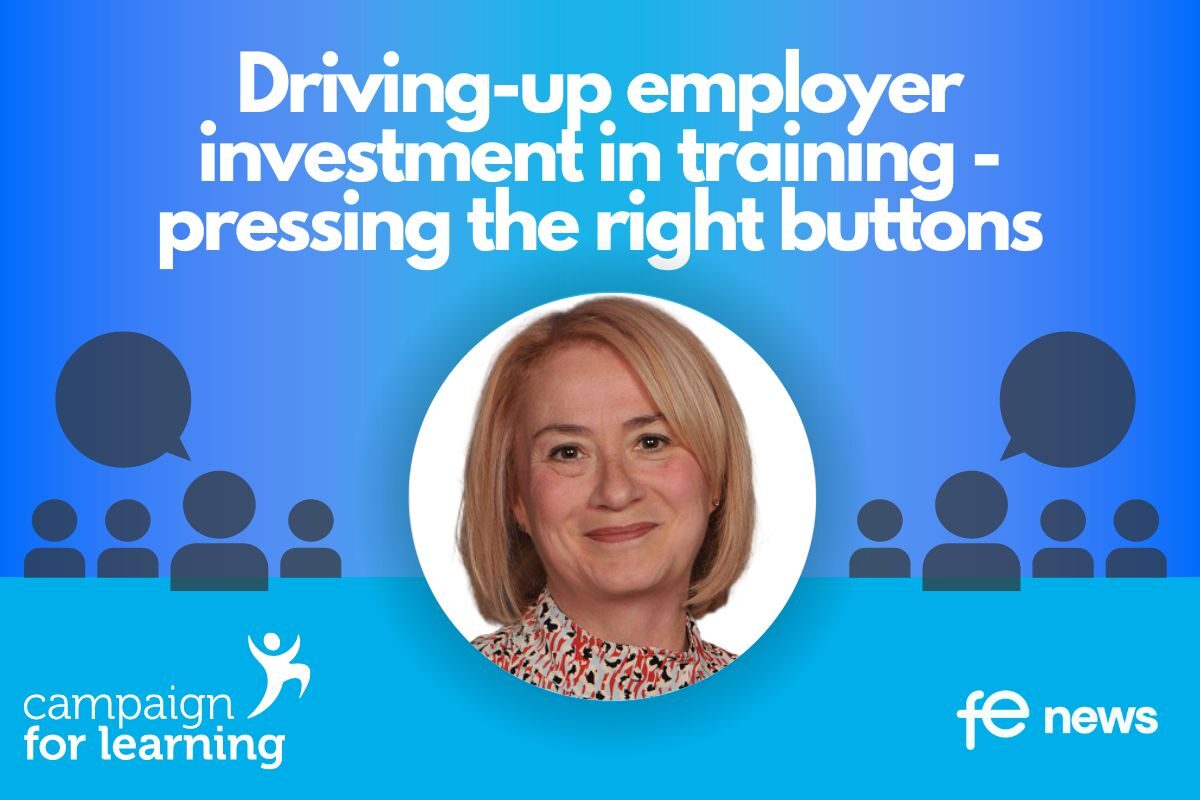Increasing employer demand for level 4-5 technical education in England

The case that employers in the UK invest too little in the training and development of their new and existing employers is established.
In 2022, the Learning and Work Institute reported that the amount employers invest in training per employee had fallen by 28% since 2005 and that UK employers only invest half the EU average per worker (Raising the Bar Increasing Employer Investment in Skills, 2022).
Prior to the pandemic in 2019, DfE noted that, ‘higher technical education uptake is low in England. Only 10% of adults aged 18-65 hold a Level 4-5 qualification as their highest, compared to around 20% of adults in Germany and as much as 34% in Canada’ (Higher Technical Education: the current system and case for change, 2019).
If we are to increase employer demand for higher technical education, we must address the following issues.
Agreeing who pays for what and that employers should pay
There are three beneficiaries from investment in higher technical education: individuals benefit in terms of potential salary returns and promotion, employers benefit from potential increases in productivity, and the nation benefits from a more productive workforce that earns more, pays more tax and in the public sector delivers better public sector services.
The trouble we have here is that under successive governments, the respective financial contributions that individuals, employers, and the state make to the cost of training and education provision has never been properly agreed or established with certainty in policy terms.
This is most recently exemplified in proposals for the introduction of the Lifelong Loan Entitlement (LLE). There is much to commend in LLE proposals that support individuals to use a loan entitlement to access modular, flexible, and full-time higher technical education and Level 6 provision throughout their life. Rightly, in the development of proposals for the LLE, government has focused on the relevance of provision to employers and skills needs.
What is missing, however, is consideration of what employers should pay for, and whether and how employers should financially contribute to such provision. If an employer can expect individuals to use government-backed loans to develop and even update the higher technical skills needed in a specific occupation, what is the incentive for the employer to invest?
We also need to challenge the behaviour of some employers and a culture that places too much focus on short-term returns rather than long-term investment. Government should revisit the proposal that employers over a certain size should be required to publish how much they invest in the training and development of their workforce.
Establishing and promoting the case for investing in higher technical education
The case for investing in higher technical education has frequently been presented as England invests substantially less than our OECD competitors. But, so what? We train lots of graduates.
A convincing case based on the tangible benefits for both employers and individuals of higher technical education in specific occupations is needed. The IfATE would be ideally placed to do this. Care, however, needs to be taken in promoting higher technical education as an alternative to bachelor’s degrees. The NHS, for example, certainly needs to train more Nursing Associates (a Level 5 higher technical occupation), but it also needs to recruit and train more Registered Nurses (a Level 6-degree occupation). Higher Technical Qualifications (HTQs) will be valuable in their own right, but will also in many cases be a useful staging point in progression to a degree and degree level occupation and/or professional qualification.
Delivering the higher technical education programmes employers need
Through its quality mark process, the IfATE is ideally placed to identify the HTQs which deliver the knowledge, skills and behaviours needed for specific occupations. What is also needed is action to support and encourage providers to offer and deliver higher technical education. Funding to support development and growth will undoubtedly help, as will (from September 2023) making HTQ courses eligible for the part-time maintenance loans on the same basis as degree courses.
But action elsewhere is also needed. As part of the rolling process to approve HTQs for specific sectors and occupations, IfATE should publish guidance on future labour market trends and the potential demand for HTQs, as well as how HTQs should be considered in Local Skills Improvement Plans (LSIP). In considering the overall direction of the FE and HE sectors, ESFA, Ofsted, IfATE, and OfS may also want to consider action to ensure that the skills sector plays an appropriate role in delivering the HTQs which employers, individuals and the economy need.
Recommendation 1
At the Spring Budget, the Government should announce a review to determine the principles of who pays and for what in terms of post-18 education and training, including Level 4-5 higher technical education.
Recommendation 2
IfATE must ensure that the Level 4-5 higher technical qualifications needed to raise productivity are available to employers. England now has a highly competent organisation in the form of IfATE that can ensure that higher technical qualifications, that meet employer skills requirements, are quality marked. What is also needed is further action to support and ensure the HTQs employers and the economy needs are available for delivery.
Recommendation 3
DfE must develop and promote the HTQ brand. Higher technical education has for decades been totally overshadowed by bachelor’s degrees. If the benefits to individuals and employers of HTQs, on an occupational basis, are clearly identified and linked to the HTQ brand, then we could see significant growth. The degree apprenticeship brand has developed over a number of years to where it is very highly regarded and prestigious. With a careful steer from the IfATE, HTQs – which are based on employer developed apprenticeship standards like degree apprenticeships – could develop in the same way.
By Mandy Crawford-Lee, Chief Executive, UVAC
This article is part of Campaign for Learning’s series: ‘Driving-up employer investment in training – pressing the right buttons’.
Part One: Employer investment in context
- Louise Murphy, Economist, Resolution Foundation: Investment in the round
- Dr Vicki Belt, Deputy Director, Enterprise Research Centre, Warwick Business School: UK enterprises and investment in capital and training
- Becci Newton, Director, Public Policy Research, Institute of Employment Studies: Employer investment in training in England
Part Two: Drivers of employer investment in training
- Neil Carberry, Chief Executive, Recruitment and Employment Confederation: Derived demand, British management and employer investment in training
- Ewart Keep, Professor Emeritus, Education Department, University of Oxford: Strategies to drive-up employer investment in training
- Sam Alvis, Head of Economy, Green Alliance: Transitioning to net zero, green skills and employer investment in training
- Dan Lucy, Director of HR, Institute of Employment Studies: Job quality, job design and driving-up employer investment in training
- Natasha Waller, Policy Manager, LEP Network: Local inward investment, business support and employer demand for training
- Jovan Luzajic, Acting Assistant Director of Policy, Universities UK: Universities, R&D, business innovation and meeting employer skills needs
- David Hughes, Chief Executive, Association of Colleges: FE colleges, business innovation and meeting employer skills needs
Part Three: Increasing employer investment in training
- Paul Bivand, Labour Market Consultant: Why should employers invest in training in a flexible labour market?
- Aidan Relf, Skills Consultant: Why should employers invest in training with large net worker migration into the UK?
- Stephen Evans, Chief Executive, Learning and Work Institute: Raising employer investment in training
- Robert West, Head of Education and Skills, CBI: Increasing employer investment in training
- Lizzie Crowley, Skills Policy Adviser, CIPD: Encouraging employer demand for training
- Anthony Painter, Director and Daisy Hooper, Head of Policy and Innovation Chartered Management Institute: Increasing employer demand for management training
Part Four: Raising employer demand for publicly funded post-16 education and skills
- Jane Hickie, Chief Executive, AELP: Increasing employer demand for post-16 apprenticeships in England
- Mandy Crawford-Lee, Chief Executive, UVAC: Increasing employer demand for level 4-5 technical education in England
- Ian Pryce, Principal, The Bedford College Group: Increasing employer demand for higher technical education in England
Part Five: Raising employer demand for work placements
- John Widdowson, Board Member, NCG: Increasing employer demand for work placements for level 3-5 vocational courses in England
- Stephen Isherwood, Joint Chief Executive, Institute of Student Employers: Increasing employer demand for undergraduate work placements in England











Responses